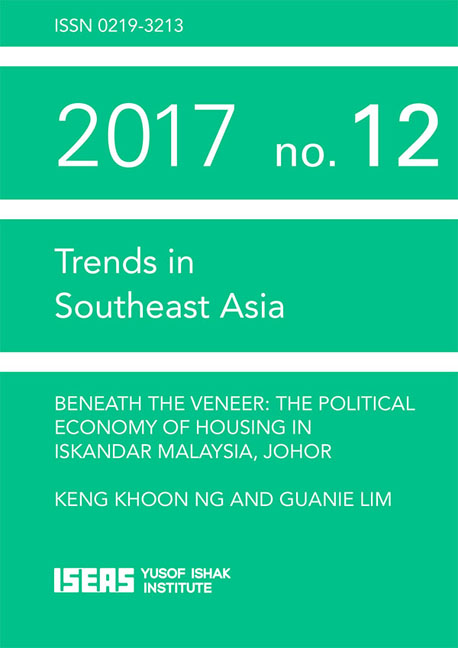Beneath the Veneer: The Political Economy of Housing in Iskandar Malaysia, Johor
Published online by Cambridge University Press: 12 March 2019
Summary
Housing development in Johor has undergone profound transformation in the last decades. High-rise apartments are now a common sight in the downtown area close to Singapore. Luxurious enclaves, complete with gated security and leisure facilities, encroach on waterfront land along the Straits of Johor. Foreign developers build new townships on reclaimed land, exhorting international buyers to invest their future in these projects as well as the rest of Johor.
This paper attempts to explore the political economy underwriting such development, analysing the housing policies and development goals of both the Malaysian government as well as its Johorean counterpart. It does so by focusing on Iskandar Malaysia, a special economic zone (SEZ) earmarked as a high-impact project since 2006 by Malaysia's economic planners. Despite some commercial success, this paper argues that Iskandar Malaysia is bogged down by tensions along two dimensions: bumiputra versus non-bumiputra interests; and federal government versus state government priorities. The paper unpacks such tensions by analysing the case of Forest City, one of the most high-profile projects in Iskandar Malaysia in recent years.
The paper begins with an analysis of Johor's housing situation. It examines statistical data from the relevant authorities to make sense of the demand and supply of houses in the state. The paper then focuses on Iskandar Malaysia, unearthing its origins and subsequent growth trajectory. In particular, it sheds light on the tension between the federal government and the Johor government in managing the development of Iskandar Malaysia. The next section analyses the changes and deviations of Johor's housing policy. In particular, it investigates the provision mechanisms of low-cost housing. A probe into such issues enables a better understanding of the state's long-term housing challenges and solutions. Thereafter, a case study of Forest City is presented for its utility in underlining the inherent conflict of housing development in Johor. The paper concludes with a summary of the main arguments.
OVERVIEW OF HOUSING DEVELOPMENT IN JOHOR
Johor is a state located at the southern end of Peninsular Malaysia. With a total land area of 19,016 km and total population of 3.66 million, Johor is the fifth largest and second largest state respectively in physical and population terms (Department of Statistics 2017). According to the Town and Country Planning Department of Johor (2017), the state's population will reach 6.06 million by 2030.
- Type
- Chapter
- Information
- Beneath the VeneerThe Political Economy of Housing in Iskandar Malaysia, Johor, pp. 1 - 28Publisher: ISEAS–Yusof Ishak InstitutePrint publication year: 2017

